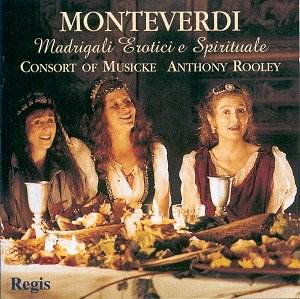I have often thought that Anthony Rooley’s Consort
of Musick were at their best during the period 1988 to 1995 when more
or less the same group of singers had been together for a decade or
so and when they had, by then, a vast experience in late renaissance
music upon which to draw. This CD proves it: a gem of its type. Performances
are powerful, direct, accurate, totally in tune and totally committed.
The recording is superb. Incidentally I assume that the works, which
necessitated continuo organ, were recorded in Italy (the jewel case
rather frustratingly does not say) quite how that came about for just
a few items would be interesting to know.
And another gripe. I realize that Regis are a budget
label but surely in addition to Rooley’s useful sideways essay on the
repertoire and the texts in English, why couldn’t we have had the texts
in Italian and Latin also beside the translations instead of the tedious
and quite extensive biographies on each of these already well known
singers which takes over four sides of an eight page booklet? Neither
are we told exactly which collections the original secular madrigals
come from, the information at the top I have researched myself for the
help of readers of this review. The Booklet tells use that the madrigals
are selected from Books 4, 6 and 8 yet one is from Book 7!
To understand what this CD is doing I will quote from
Rooley’s notes. "The main purpose of this collection … is to contrast
these highly coloured sensuous madrigals with their near contemporary
re-workings to new (sacred) texts. In 1607 a Milanese priest Aquilino
Coppini published the first of three volumes of sacred contrafacta of
these highly popular madrigals with Latin devotional texts replacing
the amorous verse. What was outward, erotic and theatrical became inward,
devotional and thoroughly christianised." So for example a text beginning
as in the madrigal ‘Lamento d’Arianne’ (book 6) ‘Let me die / How should
I find comfort when my fate is so hard / my grief so miserable’ becomes
in the ‘Pianto della Madonna’ ‘Now let me die, my son / How could a
mother find comfort in such piercing anguish / such fierce torment’
In other words a lament for the virgin at the foot of the cross.
Some individual words have not had to be altered at
all. Because it is a long work, probably from a now lost opera, the
madrigal is not recorded only the contrafactum, so a better example,
which is recorded, is the madrigal ‘Armato il cor’: ‘I come from the
realm of love prepared for battle … But I cannot win if I want your
love’. Its contrafactum is ‘Heu Bone Vir’ with its text ‘… fight steadfastly,
attack, defend, stand firm, with prayer you will repulse him’ (the Devil).
As you can see, complimentary similes are used and the original sense
remains as the music with its fanfare figures demands.
The delightful madrigal ‘Io mi son Giovanetta’ – ‘I
am young and I laugh and sing’ is transported into a Christmas motet
‘Gleaming golden in the night angelic choirs rejoice’ (‘Rutilante in
Nocte’)
So, a highly enjoyable recording and a fascinating
insight into the extraordinary and painstaking art of not allowing the
Devil to have the best tunes.
Gary Higginson


